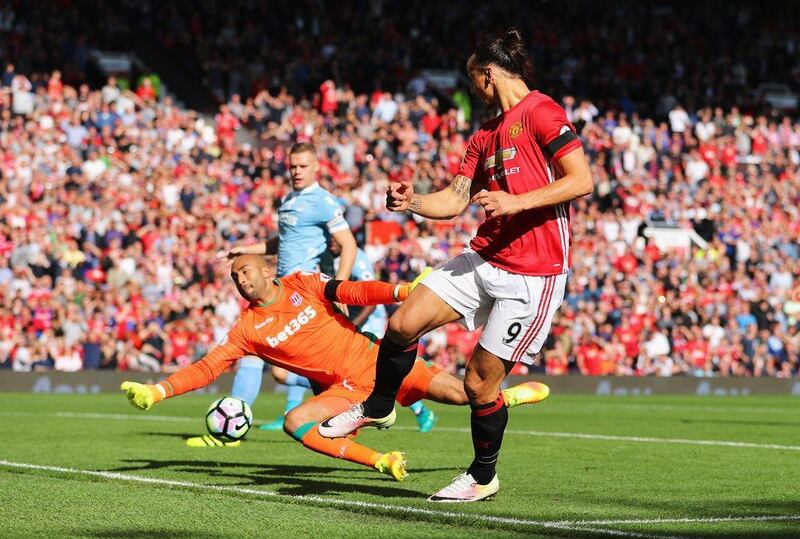Manchester United and Stoke City players wore black armbands as a mark of respect for the former United, Stoke and Arsenal striker David Herd.
The Scot, who passed away on Saturday aged 82, was one of Matt Busby’s most accomplished signings at Old Trafford. A proven goalscorer for Arsenal, the centre forward who was born close to Busby in Lanarkshire joined in 1961 for £37,000 (Dh176,200).
In seven seasons at Old Trafford, Herd scored 144 goals in 263 games, including two in the 1963 FA Cup final victory over Leicester City. Strike partner Denis Law got the other. Herd also scored on his United debuts in the FA Cup, League Cup and all three European competitions.
On November 26 1966, Herd scored against three different Sunderland goalkeepers in the same match. Regular keeper Jim Montgomery went off injured and was replaced by John Parke and then Charlie Hurley. Herd scored four in United’s 5—0 victory.
Before Arsenal, Herd played for Stockport County where he became only the second player in league history to play in the same team as his father.
Father Alec had starred for Manchester City alongside Busby. Like Busby, Herd was born close to Motherwell, an area where a high concentration of former United players were born including Joe Jordan, Brian McClair, Jimmy Delaney, Arthur Graham, Jack Picken, Tom Reid, Charlie Rennox, Jim Holton, Harry McShane and Francis Burns.
While still at United, Herd bought a garage in Davyhulme, five miles from Old Trafford.
“I had to get permission off Sir Matt Busby,” recalled Herd, when this writer spoke to him. “I was coming to the end of my career and wanted to look at my income after football. Luckily, Sir Matt said it wouldn’t be a problem.
“I bought the garage in Davyhulme because I lived locally. The garage took my name because people knew it at the time. Most of the United players also lived in that area, but none of them bought a car from me. We didn’t tend to sell the most expensive models.”
Injury meant that Herd, like Law, was unable to play in the 1968 European Cup final, but both were awarded medals. Two months later, Herd, then 34, moved to Stoke.
“I had two good years there. Stoke didn’t win anything but we used to beat the big teams at home. My business partner mainly ran the garage and I trained in the morning and returned in the afternoon to work. I wouldn’t imagine a top footballer doing that now.
“Players earn enough money from football these but I’m not envious. I was on £100 a week at United which was a lot of money.”
Herd finished his playing days at Waterford under old United friend Shay Brennan before becoming manager at Lincoln City in 1971.
“I had 21 months at Lincoln before the directors replaced me with a young Graham Taylor,” Herd said. “I didn’t like the experience of that so I went back to the garage and worked there until I sold out and retired in 1998.”
The garage still carries his name.
Herd retired to a life of playing golf four times a week at Ashton on Mersey, close to where United now train on the edge of Manchester’s urban fringe.
As a youngster he also played minor county cricket, and was on the committee of the Manchester United old boys association with David Sadler, John Doherty, Warren Bradley and Pat Crerand.
The latter once said that Herd was one of the most underrated players ever to play for Manchester United.
Talking to The National before United's 1-1 draw against Stoke City, Crerand said: "David was a terrific centre forward. He consistently scored 20 goals a season for Manchester United and was well worth his place in a great team.
“He had the most powerful shot and scored so many goals from outside the area. With players like Bobby Charlton, George Best, Denis Law and David Herd in front of me, tackling, playing through balls and defending were my priority rather than scoring.”
That was left to players like Herd, one of the few to have scored more than 100 goals for both United and Arsenal.
[ sports@thenational.ae ]
Follow us on Twitter @NatSportUAE
Like us on Facebook at facebook.com/TheNationalSport






